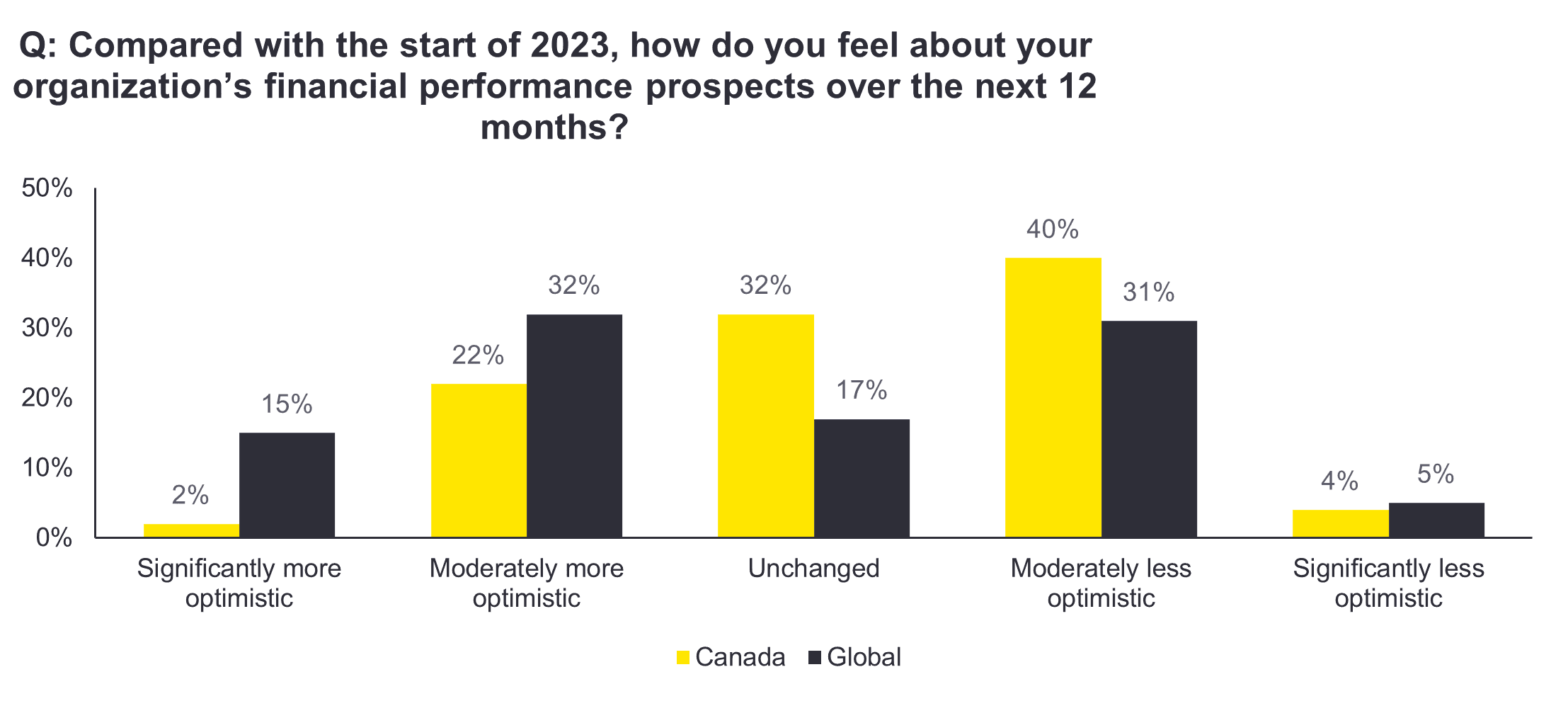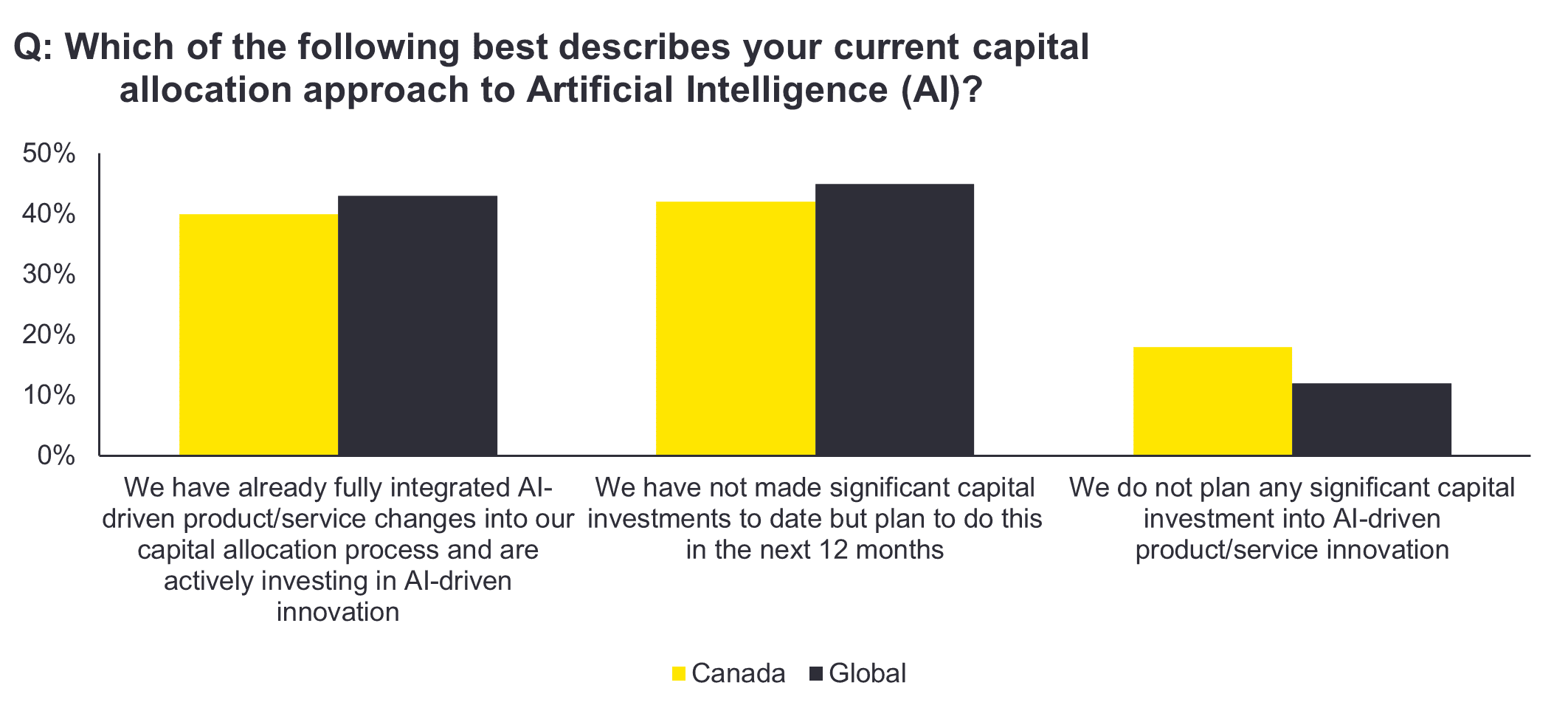EY refers to the global organization, and may refer to one or more, of the member firms of Ernst & Young Global Limited, each of which is a separate legal entity. Ernst & Young Global Limited, a UK company limited by guarantee, does not provide services to clients.

In 2023, the global economic landscape has shown signs of improvement, particularly in developed economies. In Canada, tighter monetary policy, declining energy prices and easing of supply chain disruptions have contributed to lowering inflation, providing some relief to business activity.
Although previous concerns of a severe economic slowdown show signs of easing, new risks concerning cybersecurity and artificial intelligence (AI) are at the forefront of challenges faced by Canadian businesses.
Amid these challenges, Canadian CEOs are directing their efforts towards strategic M&A deals for promoting sustainability, enhancing capabilities, and increasing partnerships. However, the Canadian economy continues to face headwinds, exacerbated by volatile global markets and mounting cost-of-living pressures, which require Canadian businesses to cautiously navigate these complexities to secure a stable and prosperous future.
The following themes represent some of the key challenges, strengths and opportunities applicable to Canada:
Canadian business sentiment weakens as global confidence grows
Fears of an economic slowdown are front of mind for Canadian CEOs, with nearly half lowering their business performance optimism since the start of 2023. However, global CEOs adjusted their expectations towards a more optimistic view, with a smaller proportion anticipating a persistent economic slowdown in comparison to their Canadian counterparts (41% and 52%, respectively).
While overall business sentiment has been relatively weak in Canada, there are indications of relief in cost pressures and labour shortages. However, rising interest rates over the past two quarters have affected business activity and contributed to increased concerns of reductions in sales, projected sales and investment intentions.[i] As a result, only 24% of Canadian CEOs report greater optimism regarding their companies’ financial performance over the next year, whereas 47% of their global counterparts are more optimistic.
[i] Bank of Canada, Business Outlook Survey - Second Quarter of 2023.

Geopolitical risks highlight threats to business performance
As the global economic landscape evolves and shows signs of fragmentation, business performance is at risk from emerging trends, such as cybersecurity and regulatory risks as well as geopolitical conflict.
Both global and Canadian leaders have acknowledged a significant level of exposure to these issues. Specifically, 66% of Canadian CEOs express concern about technology disruption and cyber risks, while global CEOs stand at 57%. Further, regulatory risk is a prominent concern for 62% of Canadian CEOs, compared to 54% among global CEOs. For example, AI regulation is front of mind for Canadian policy makers, which may have widespread implications for Canadian industries.[ii]
As such, 52% of Canadian CEOs are planning to delay investments, higher than their global counterparts (40%). Global economic fragmentation was indicated by both Canadian and global leaders as the primary driver behind their decision to adjust their investment, operational and supply chain plans. Canadian leaders also expressed concerns regarding new taxes or industrial policies and social unrest, while global leaders were primarily focused on restrictions on trade and foreign investment, as well as regulatory pressures.
[ii] Innovation, Science and Economic Development Canada, Artificial Intelligence and Data Act.
Capital allocation strategies and priorities differ among Canadian and global CEOs
Despite this, strategic deals are still top of mind. Over a third of Canadian CEOs (36%) report M&A deals are a primary focus of their capital allocation strategy in the next 12 months. Canadian CEOs pursuing M&A activity and investing in organic growth initiatives are prioritizing integrating sustainability into core products and services, increasing skills and capabilities, and strengthening ecosystems, alliances and partnerships. In comparison, only 26% of global CEOs share the same sentiment, focusing more on a push for technology and innovation, product development/improvement, and expansion into new markets.
However, when factoring in other capital allocation strategies such as maintaining cash reserves and distributing capital to shareholders, sustainability initiatives are of comparatively less importance to Canadian CEOs. In comparison to 34% of global CEOs, 42% of Canadian CEOs either do not view sustainability initiatives as a priority or do not assign substantial importance to them in their capital allocation strategy.
Opportunities in AI could stall amid regulatory and cybersecurity concerns
While the majority of Canadian CEOs are actively investing in AI initiatives (82%), global leaders are ahead, with 88% having already allocated significant capital or planning to do so in the next 12 months. This discrepancy may stem from concerns among Canadian CEOs regarding cybersecurity.
Canadian leaders are closely monitoring the potential impact of technology-related disruption, such as cyberattacks on business performance in the coming year. Concerns regarding technology and cyber-related risks associated with AI are prevalent, with 70% of Canadian CEOs maintaining the view that we are not doing enough to manage the unintended consequences of AI, and 64% supporting the view that we should be more proactive to mitigate the potential risks posed by bad actors exploiting AI technologies. These insights highlight the ongoing developments and challenges in the AI landscape for Canadian leaders, as they weigh the opportunities and risks presented by this transformative technology.

Summary
A recent EY study of 1,200 CEOs globally reveals that Canadian CEOs are directing their efforts towards strategic M&A deals for promoting sustainability, enhancing capabilities, and increasing partnerships.



